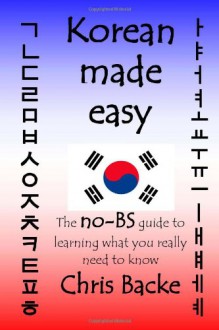NOW - Version 2.0 released November 3, 2011 - several sections expanded, made the Korean larger, upgraded table of contents. Coming to Korea? • Want to teach English in Korea? • Want to do business in Korea and really understand the way they think? • Want to chat with a cute / handsome Korean at...
show more
NOW - Version 2.0 released November 3, 2011 - several sections expanded, made the Korean larger, upgraded table of contents. Coming to Korea? • Want to teach English in Korea? • Want to do business in Korea and really understand the way they think? • Want to chat with a cute / handsome Korean at the club? • Want to do more than just order a beer or stumble around the major tourist destinations? It's time to LEARN KOREAN. But I HATE learning languages! you say. I can understand that - it takes too long, there's too much to learn, or whatever. This e-book will highlight several hundred words and phrases you're definitely going to use. Everything from ordering a beer to telling the doctor where it hurts is here - and logically organized to help you find things later on. Hi, I'm Chris Backe. I'm an English teacher and professional writer currently living in Seoul, South Korea. When I first moved to Korea, I wasn't sure I'd ever pick up the language. Why? Every book that tried to teach me Korean did the same thing: they spent maybe three pages on the basic parts of the language, then jumped right into full phrases and lecturing about boring points of grammar. Yawn. Sure, I ended up learning a fair amount of Korean - and I realized there was an easier way: let's learn the stuff you're actually going to use in Korea. You will probably never need to know the phrase 'I am wearing a green sweater', so why learn it? You WILL use the phrase 'Where is the bathroom?', so you WILL learn that one. It's that simple. Here's the strategy: Use words and phrases, not stupid dialogues. We're going to pair up the words and phrases, show you what it looks like in Korean, then show you how to say it in simple English syllables. It's as simple as that. Write it on flashcards, say it over and over again, use post-it notes, practice with your significant other, whatever. Here are the tools - use them in whatever way works for you. This book is not a dictionary - it's designed specifically for people coming to Korea or people interested in Korea. You'll start with hangeul, the Korean alphabet. You'll learn the letters, how to put them together, and how to make sounds with them. Later on, we'll talk about everything from Korean alcohol to getting off the beaten path. The biggest difference between this book and those produced by Koreans: I am not a professional Korean teacher. That means I'm not going to throw any fancy language terms like 'fricative' or 'nasal consonant' at you. It also means I know what you want to learn. I've been there. We're going to keep this so simple, even a fifth grader could keep up. I teach English to elementary schoolers, so I'd like to think I know what that means :) So what else are we going to talk about? • Getting the pronunciation right - the locals are picky about this. • About formalities and honorifics - a big deal in this Confucian-based society. • Getting to know people - everyone from co-workers to your boss. • The holidays Korea really celebrates - including the ones you WON'T find on your calendar. • Eating - with a special section for vegetarians and those with allergies. • Korean alcohol - some of the most potent stuff around. • Curses - the words and phrases that'll make the old people blush. • Handling your students (if you're an English teacher) • Talking to your boss and co-workers (if you're a businessperson). • Traveling around Korea - how to read the maps, ask for help, and get around without a guidebook. • Enjoying the jimjilbang - A Korean sauna / spa that'll make you sweat and leave you relaxed. • What to say when you feel like crap. • Lots of Korean expressions - including some expressions that locals have never heard from a foreigner's mouth. And plenty more. All this comes to you from a native English speaker, living in Korea, who works with Koreans on a daily basis. So what are you waiting for? Stop messing around, get it now, and START LEARNING KOREAN.
show less

